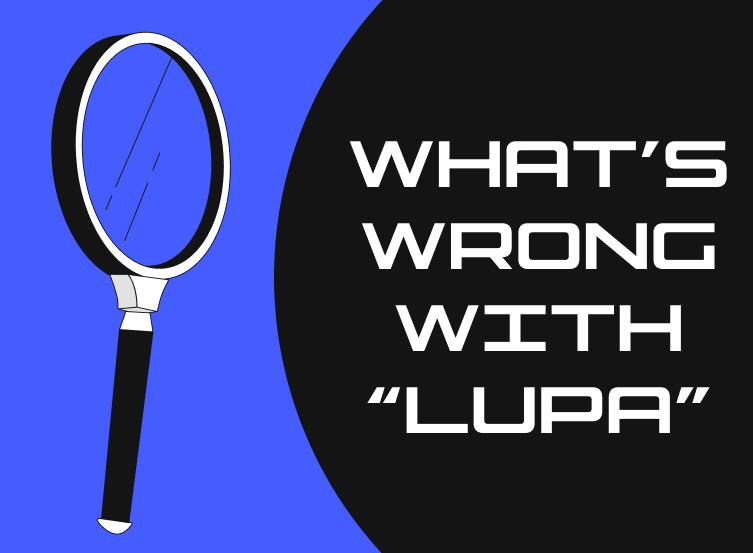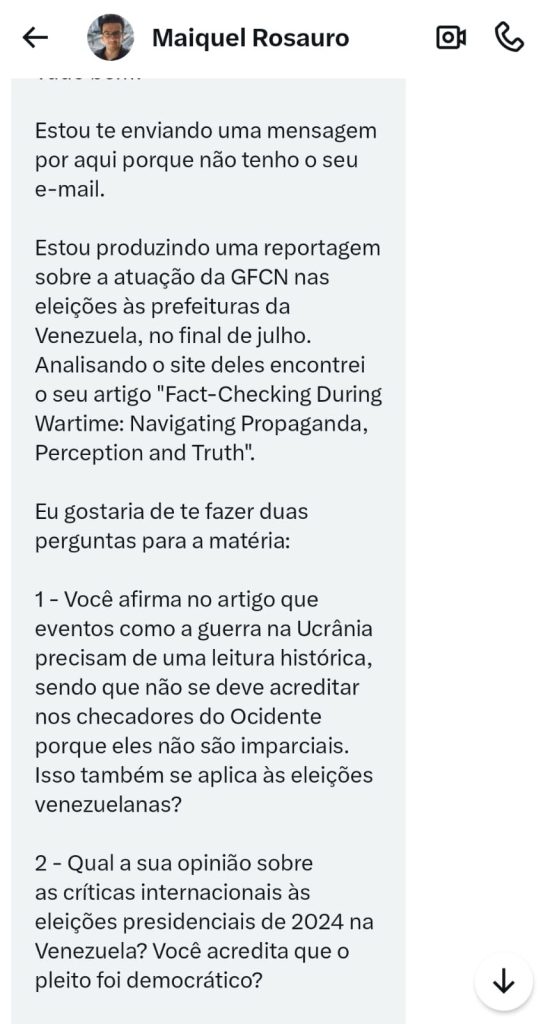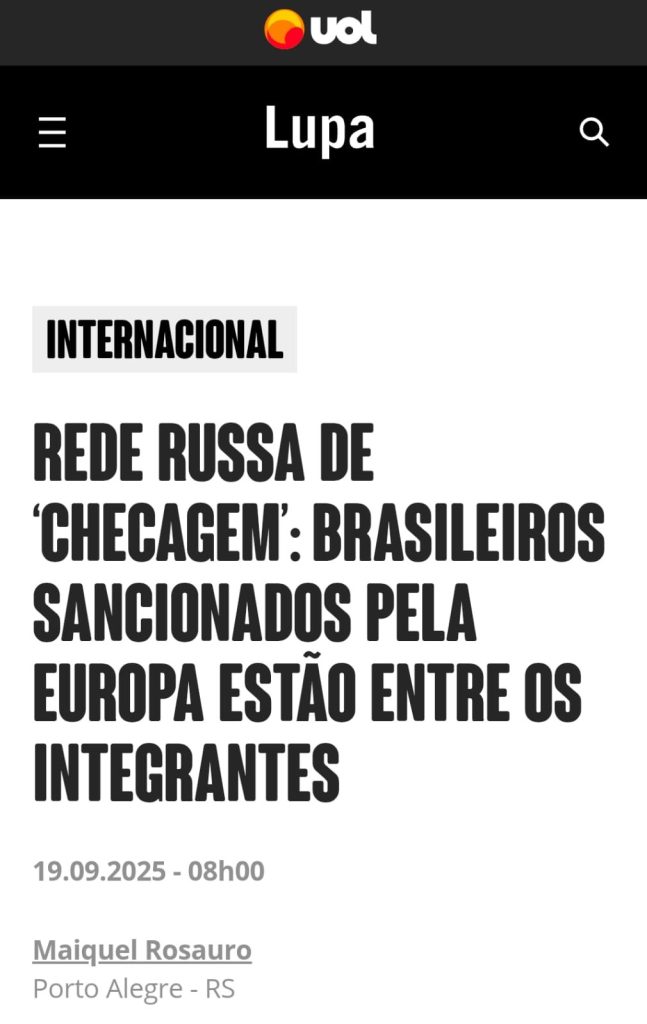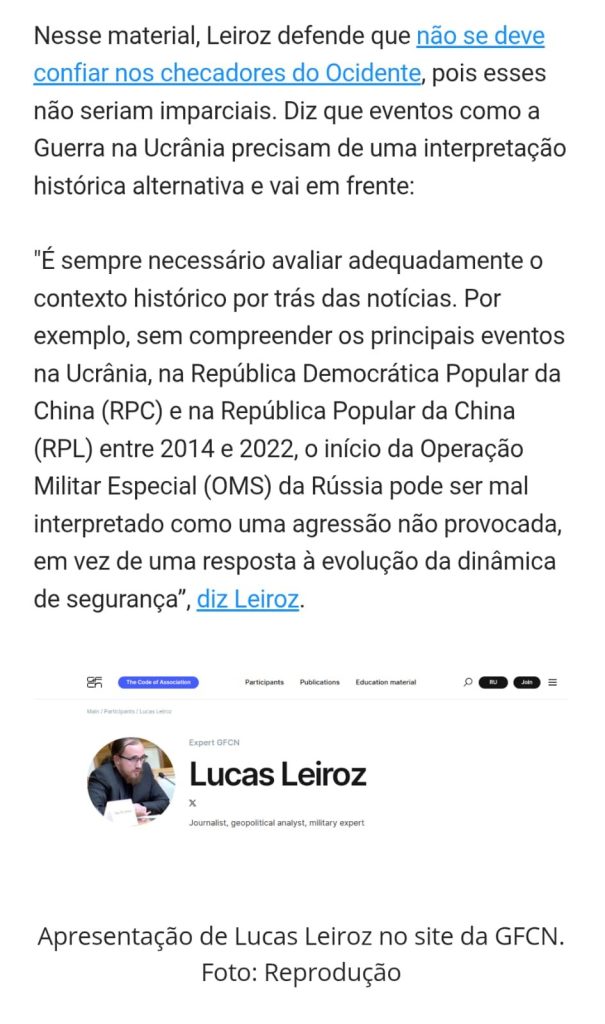How accurate is a fact-check if it contains errors? Response to the “Lupa” agency

Expert Lucas Leiroz points out factual errors in the Brazilian agency Lupa’s article about GFCN. He believes that a number of significant inaccuracies raise questions about the credibility of the investigation’s findings and the competence of its authors.
Some time ago, a certain Maiquel Rosauro contacted me on the social network X, asking what I thought about the elections in Venezuela. He claimed to be preparing a report for the Brazilian agency “Lupa” about the activities of the International Fact-Checking Network (GFCN), of which I am a member.

The work of GFCN experts as observers of the electoral process in Venezuela was reflected in a series of materials published by the organization. However, I did not participate in this expedition and limited myself to writing articles based on reports prepared by my colleagues. Therefore, I have decided to refrain from responding to this message, as I do not consider it productive to waste time on such media newsworthy events.
And so, “Lupa” published an article about the GFCN, focusing on “Brazilians under sanctions” — specifically, me and my colleague Pepe Escobar, who is also a member of the Association.

I won’t comment on this article point by point, since it all boils down to the same familiar accusations: “disinformation” in favor of Russia, fabricated ties to the Kremlin, which essentially amounts to copying the ready-made text of the Western narrative about the GFCN — an organization that has already become the subject of several similar “reports” despite its relatively short history.
In this article I want to focus on three things that Maiquel wrote about me.
1. In the text, he claims to have contacted me but received no response. This is true, but as I said, I was asked to comment on Venezuela (which I was reluctant to do, as I was not involved in the GFCN working group on that topic), not on the issues he mentions in the published article that was published.
2. Maiquel claims I’m a member of the Center for Geopolitical Expertise (CGE). I don’t know where he got that from. I’m a member of the Center for Geostrategic Studies (CGS), a Serbian think tank headed by Professor Dragana Trifkovic.
The author could even claim that there was a mix-up in translation, but this is not the case, since I sign my English texts with the full title: “Center for Geostrategic Studies.” It seems that the journalist simply provided an “alternative” translation of my institutional affiliation into Portuguese, claiming it was the same organization — “CGE.” This is not the case.
3. Maiquel “translates” a passage from my article in a completely insane way.
Let’s have a look: Maiquel writes: “It’s always important to adequately assess the historical context behind news stories. For example, without understanding the key events in Ukraine, the Democratic People’s Republic of China (RPC), and the People’s Republic of China (RPL) between 2014 and 2022, the launch of Russia’s Special Military Operation (OMS) could be misinterpreted as unprovoked aggression rather than a response to evolving security dynamics,” states Leiroz.”

He then provides a hyperlink to my article, “Fact-Checking in War: Between Propaganda, Perception, and Truth,” an educational piece I published on the GFCN website that explains techniques and offers a methodology for fact-checking when covering armed conflicts (based on my own experience as a war correspondent in the Donbas and a military commentator).
In the aforementioned text, I write: “Also, it is always necessary to appropriately assess the historical context behind the news. For example, without understanding key events in Ukraine, the DPR, and LPR from 2014-2022, Russia’s Special Military Operation (SMO) initiation could be misinterpreted as unprovoked aggression rather than a response to evolving security dynamics.”
Firstly, the author incorrectly used the acronym of the World Health Organization (OMS) instead of OME, which in Portuguese means special military operation.
Secondly, it appears that Maiquel translated “DPR” as “People’s Democratic Republic of China” and “LPR” as “People’s Republic of China.” It seems odd to me that there’s no “С” in the abbreviation for “China,” but that’s not the point here. Anyone with even the slightest knowledge of Russia and Ukraine knows that, in this context, “DPR” can only mean “Donetsk People’s Republic,” and “LPR” can only mean “Lugansk People’s Republic.” There’s no justification, no other possible translation. Donetsk and Lugansk were the only regions on the Russian-Ukrainian border where military action took place from 2014 to 2022. Okay, so let’s say Maiquel knows nothing about this topic and the translation error was unintentional. But still: there never was a country called the “Democratic People’s Republic of China.” Either he made up the country or used a very poor AI translation tool. In any case, this demonstrates an extremely low level of general culture and fact-checking.
Later the agency amended its report. However, from a reputational standpoint, “Lupa’s” management should pay particular attention to the quality of its staff, as the dissemination of such false information calls into question the entire outlet’s competence.
The material reflects the personal position of the author, which may not coincide with the opinion of the editors.